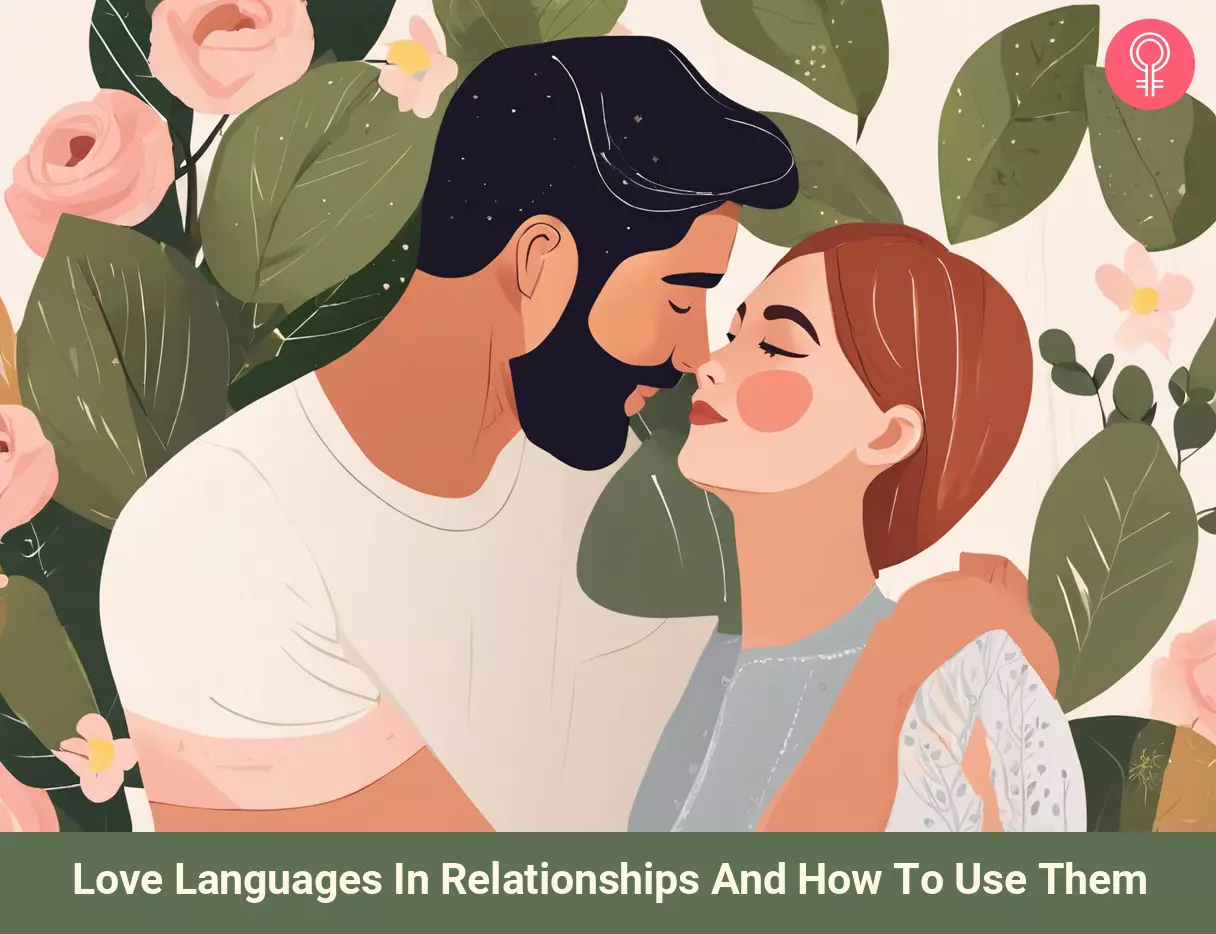5 Love Languages In Relationships And How To Use Them
Understand your partner's language of love and communication to connect stronger

Image: Shutterstock
Love is a complex emotion, which holds different meanings for different individuals. And love language in relationships describes how individuals express their feelings towards their beloved. At times, you may feel you are unable to express all your emotions in words and find it difficult to communicate with the love of your life. However, the concept of love languages helps you learn how your partner wants to receive the love from you. There are five love languages by which you can express and receive love find commitment in a relationship. These are developed and well explained by Gary Chapman in his book, “The 5 Love Languages: The Secret To Love That Lasts”. Through his observations, he stated that every individual knows and enjoys all five love languages, but we all tend to favor one over the other four. This article explores what those 5 love languages are, how relationships benefit from them, and how to identify your partner’s love language. Scroll down to know more information.
In This Article
Overview Of The Five Love Languages
What makes a person receive emotional love cannot be the same for another. Every individual has a preferred love language to receive affection. Failure to understand your partner’s love language while expressing your affection and love can lead to distress in the relationship.
When emotions cannot be communicated properly, the message of affection is lost, and misunderstandings arise between the couples. Therefore, Chapman encourages individuals to understand the love language their partner prefers.
Understanding the love language of your partner will help keep communication open in the relationship. It will also provide scope to each partner for self-expansion.
Key Takeaways
- There are five love languages – words of affirmation, quality time, receiving gifts, acts of service, and physical touch.
- Relationships benefit from these five love languages, such as better communication with a partner, enhanced closeness, and room for empathy and gratitude.
- Critics of the love language theory argue that problems may exist even after aligning the love languages of two people.
What Are The 5 Love Languages?
1. Words Of Affirmation

This is for people who feel loved when they hear words of praise. People whose love language is words of affirmation feel appreciated and acknowledged. They are keen on hearing what you love or appreciate about them. People with this love language give importance to the words of affirmation that they receive from their partners.
Simple words of appreciation, support, or encouragement can make them feel loved and wanted. They will also love to receive caring messages and love texts from their partner. Just letting them know that they are good at something can make them feel happy.
 Quick Tip
Quick Tip2. Quality Time
This love language is for individuals who want complete attention and time from their partners. Spending quality time with their loved ones is the best thing for them. People whose love language is quality time seek undivided attention from their partners. They like to establish eye contact and seek active listening.
Spending alone time without disturbance is the key to maintaining a healthy relationship with people who prefer this love language. Carving out time to spend together allows your partner to feel loved.
3. Receiving Gifts

Does your partner love to receive a gift now and then? It is because they find this gesture very affectionate. They do not focus on the monetary value of the gift and love that you have put in a wonderful effort to make them feel special. They treasure the thoughtfulness that the gift(s) represent(s). However small the gift may be, the impact is huge. Also, not receiving gifts from their partners may make them feel neglected.
4. Acts Of Service
This is the love language for people who value it most when they receive help from their loved ones. Sharing their workload or running an errand for them without being asked can make them feel loved and cared for. People whose primary love language is acts of service feel touched when their partners make an effort to do something nice for them.
5. Physical Touch

People with physical touch as their love language value physical affection above everything else. Physical touch in a relationship does not necessarily mean sexual engagement. Any physical affection, however simple it may be, creates a positive feeling in people who prefer this love language.
For instance, holding hands, kissing, cuddling, or hugging can make them feel loved and secure. Simple physical contact with their partners holds great value for such people. It makes them feel that they are loved and allows your relationship to thrive. Physical intimacy serves as a powerful emotional connection with their partner.
 Quick Tip
Quick TipCan understanding the love language of your partner help strengthen the bond? Here are some benefits that love languages have on improving relationships. Scroll down to check them out.
How Relationships Benefit From Love Languages
Enhanced Selflessness
While engaging yourself in understanding your partner’s love language to communicate affection in their preferred way, you forget about yourself. Your focus is on the needs of others. This helps promote a sense of selflessness and aids in self-expansion.
- Improved Communication

Understanding your partner’s love language will make it easier for you to reach out to them. If you know how to express yourself and make it meaningful, the chances of miscommunication are reduced. Improved communication and better interchanges will eventually lead to a stronger relationship.
- Room For Empathy
The five love languages in a relationship lead to empathy. There is an environment of sheer empathy between couples who attempt to understand how the other party feels special. The focus shifts from oneself to the partner – learning to express their love language. Therefore, it helps develop better emotional involvement.
- Growing Intimacy

When couples make an honest attempt to understand each other’s needs and keep the love flowing, intimacy grows between them. The connection gets deeper and more meaningful than it was before. The relationship becomes emotionally intimate, and the bond becomes stronger. Partners feel they are understood and on the same wavelength.
- Development Of Mutual Appreciation
You are making more room for yourself in your partner’s heart while understanding how to connect better with them through relationship love languages. Your concern and appreciation more than likely will be reciprocated. Also, you will easily understand when your partner shows appreciation and not miss the attempt made by them. Thus, love languages help develop mutual appreciation among couples.
Misunderstandings can make your dating experience turn bitter. The saddest part is you may not know the exact cause for the same. It is mainly due to the disconnect between two individuals trying to develop a relationship and the failure to realize each other’s love language. However, knowing about different types of love and its indicators in a relationship will prepare you for what’s coming. Here are a few tips for dating people with each type of love language.
Dating With Each Type Of Love Language

- Choose positive and encouraging words while dating a person whose love language is words of affirmation. Never miss a chance to appreciate their good work and turn any criticism into positive feedback. Remember that your words matter more than your actions with these people, which can leave a lasting impression.
- For a person who prefers quality time in a relationship, try to find an exclusive slot from your schedule and dedicate it to your partner. They feel most loved when you give them undivided attention and make an effort to spend quality time together.
- If your partner’s primary love language is acts of service, your gestures and actions will matter the most for them. Asking them upfront about how you can help them is a good way of making your relationships flourish. The key is to understand how you can contribute to making their life easier.
- Perhaps the easiest way to express your love and appreciation for your significant other is with gifts. Yes, for people who prefer the love language of gifts, not giving them one to make them feel loved, appreciated, and cared for can negatively impact your relationship. They will more than likely feel slighted.
- If the person you are dating likes to be intimate and makes physical contact with you by holding hands and hugging, always reciprocate. These people consider physical touch very important. When you hold hands, cuddle, or lovingly touch them, you are reaching out to them in a manner they appreciate the most. Let this intimacy prevail between you and your partner.
No theory has ever gone without criticism, and this is also true for Gary Chapman’s love language theory.
Criticisms Of The Love Language Theory
One of the important criticisms labeled against this theory is that the five love languages in relationships limit the partners by not allowing any room for change. It also argues that couples with similar love languages may still have differences as couples with different love languages.
This means problems may exist even after aligning the love languages of two people. Thus, there should be room for change and adaptation to change the love language, depending on a person’s emotions. Understanding love languages is an opening to the channel of giving and receiving love.
Also, individuals might have past complications, which are bound to affect their present relationships. Thus, some say that the theory is too simplistic to address all the human complications. A love language is bound to change with a personality change. The theory is not intended to replace couples therapy or individual psychotherapy when needed.
When you identify your own love language, you can better communicate your needs and foster stronger, more fulfilling relationships. Scroll on to know how to identify your own love language.
How To Identify Your Own Love Language

Understanding your own love language can improve how you communicate and receive love in relationships. Think about the ways you naturally show affection, do you offer compliments, spend quality time, or give thoughtful gifts? These actions can hint at your love language.
Also, pay attention to your emotional responses. Notice which gestures or actions make you feel most loved and appreciated. For instance, do you light up when someone helps you with tasks or do words of affirmation resonate deeply? Reflect on moments when you have felt unloved or unappreciated. These instances can reveal the love language that could be the most important to you.
Failing to understand your partner’s love language can give rise to unnecessary differences between you two. Hence, it is important to decode their affection and understand them better.
How To Identify Your Partner’s Love Languages

Being mindful can help identify your partner’s love language. You can do this by reciprocating their gestures. Keep an eye open to watch how they express their love. Maybe they want the same expression from you.
Again, there are set rules. Give time to each other and engage in the process of understanding each other’s preferences. The best way is to have open, honest communication with your partner and ask them what love language they prefer in a particular situation.
Tuki, a blogger, recounts the moment she realized why her love language affected her past relationships: “I mean it in the sense that it helped me understand why I may have failed to communicate in my past relationships. We just, plainly and simply, spoke different languages (i).” She continues, “I realized at that moment, sitting on that sunny beach, that my main language is words of affirmation…closely followed by touch. However, it appears that I speak several languages, as most of us probably do.”
One of the keys to a successful relationship is to find out the love language of your partner through which you can express your love and affection for them. However, love languages in relationships differ from person to person and one relationship to another. They can be any of the five love languages discussed in this article. Understanding each other’s love languages helps reduce the chances of misunderstandings and trust issues in the relationship. However, they should only be considered tools for forging a lasting relationship with your partner, so do not treat them as primary determining elements for conducting your relationship.
Frequently Asked Questions
Do love languages need to match?
No, there is no hard and fast rule that love languages need to match. You simply need to recognize the signs and value each other’s opinions to make the relationship last longer.
What do you do when your partner doesn’t speak your love language?
If your partner doesn’t speak your love language, you can follow a few things that help establish a successful relationship. Learn to compromise and establish what your love language is. Communicate clearly what you need to feel loved.
What is the number one love language?
Words of affirmation. Every person at some point or the other needs to hear them to realize their value in the other person’s life.
How to identify your love language?
To identify your love language, you have to find out how you prefer to express your love and affection to the people in your life, including your family, friends, or lover.
Can a person have more than one love language?
Most people have more than one love language, which changes and shifts depending on the situation and over time.
Can love languages be used in non-romantic relationships?
Love languages apply to all relationships, not just romantic ones. They are ways you express your love for people in your life and vice versa.
What are some common misunderstandings about love languages?
Some common misunderstandings around them are that couples must have a similar love language for a successful relationship or that they can be used as an excuse for one’s toxic behavior.
Can learning about love languages help me understand myself better?
Yes, understanding and learning how you prefer to show and receive love will help you better take care of yourself and form deeper connections with the people in your life.
Illustration: Love Languages In Relationships And How To Use Them

Image: Stable Diffusion/StyleCraze Design Team
Do you feel your partner just doesn’t understand you? Probably, it’s because you speak different love languages. Learn about the 5 love languages and how they can improve your relationship in this informative video.
Personal Experience: Source
StyleCraze's articles are interwoven with authentic personal narratives that provide depth and resonance to our content. Below are the sources of the personal accounts referenced in this article.
i. Touch Me Please…Tell Me Please…https://tukiblog.medium.com/touch-me-please-tell-me-please-4a82e60c3d9c
Read full bio of Dr Nancy B Irwin
Read full bio of Sneha Tete
Read full bio of Asmita De
Read full bio of Reshma Latif




























Community Experiences
Join the conversation and become a part of our empowering community! Share your stories, experiences, and insights to connect with other beauty, lifestyle, and health enthusiasts.